São Paulo, Brazil
Like the continental United States, South America is a major producer of the crops that feed the world. St. Louis ecosystem partners have been building relationships with Yield Lab LATAM and other agtech partners in South America for years, and on June 18, Danforth Center Executive Director of Innovation Partnerships Stephanie Regagnon, her team, and a cross-functional group of these partners travelled to São Paulo, Brazil, to attend the World Agri-Tech South America Summit. The Summit is known worldwide as a conference that brings together the most important players in all areas of agtech, from scientists to growers to investors.
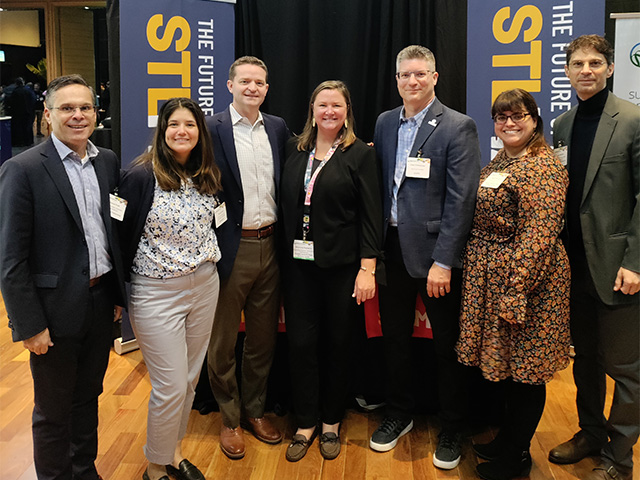
St. Louis booth at the World Agri-Tech South America Summit in São Paulo, Brazil. Pictured from left to right: Dennis Pruitt, Carola Dowd, Ben Johnson, Stephanie Regagnon, Chad Zimmerman, Isabel Acevedo, and Sean Mullins.
“After years of building these relationships, we got the chance to see firsthand what is going on in the world of Latin American agriculture innovation” Regagnon said. “While we were there, it was critical for us to deliver the message that St. Louis is the place to be for agrifood tech in the United States, right here in the heart of the heartland.”
The team that traveled to São Paulo included Regagnon, Danforth Center Community Innovation Manager Isabel Acevedo, Ben Johnson of BioSTL, Chad Zimmerman and Carola Dowd of Global STL, Dennis Pruitt of Missouri Partnership, and Sean Mullins of World Trade Center St. Louis. Each organization has a slice of the St. Louis story to tell, and they were impressed by how many people were well-aware of the region’s agtech ecosystem and actively wanted to engage.
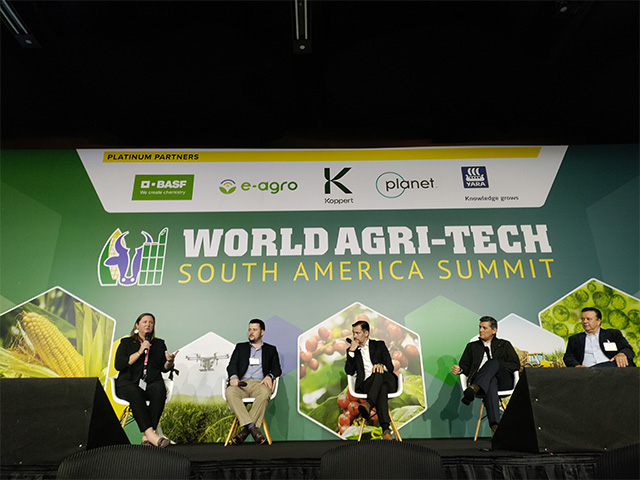
Stephanie Regagnon of the Danforth Center chaired “Agricultural Data: Optimizing Accessibility, Uptake, and Value,” a panel discussion at World AgriTech. Pictured from left to right: Stephanie Regagnon, Pedro Ronzani of EarthDaily Agro, Leandro Carrion of John Deere, Victor Mondo of EMBRAPA, and Ricardo González of PepsiCo.
While there, Regagnon spoke as a panelist for “Agri-food tech: Investing in a Sustainable Future,” hosted by the Yield Lab LATAM. The panel featured representatives from Nestlé Mexico, Mattos Filho, and PwC and focused on the potential of agricultural innovation to find sustainable solutions for a healthier environment and a well-nourished population. She also chaired “Agricultural Data: Optimizing Accessibility, Uptake and Value,” a panel discussion between leaders of PepsiCo, The Brazilian Agricultural Research Corporation (EMBRAPA), John Deere, and EarthDaily Agro about the kind of agricultural data that is currently being collected and its potential for practical application in the field and future uses for consumer brands to achieve their goals in sustainability.
The team also visited AgTech Garage, one of the biggest agtech innovation hubs worldwide. AgTech Garage brings large companies, startups, producers, investors, and other actors in the agtech ecosystem together in one space, all working toward the same goal: to develop solutions that make agribusiness more inclusive, competitive, and sustainable. The group also met with representatives from Centro de Tecnologia Canavieira, a Brazil-based sugarcane technology company with a subsidiary in BRDG Park. The trip concluded with a visit to Luiz de Queiroz College of Agriculture (ESALQ), one of the most well-renowned institutions in science, technology, teaching, and extension services for Brazilian agriculture.
Collectively, the St. Louis team attended over 30 meetings and made more than 100 new connections. Those connections were exactly what brought them to World Agri-Tech. “We want innovators and early-stage companies to know that when the time comes for them to expand to the U.S. market, it should be here in St. Louis,” Regagnon said. “We were also there to connect and explore how we can help burgeoning innovation ecosystems thrive where they are. It will take innovation globally, on every continent, to continue to foster solutions that will feed the world.”
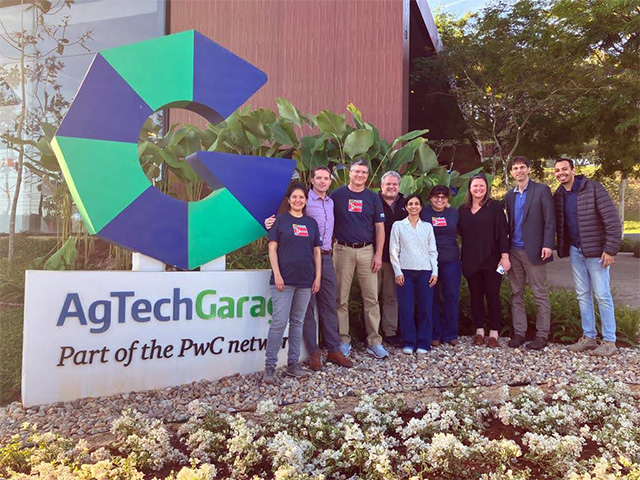
The St. Louis team visited AgTech Garage, a major hub for agtech innovation in Brazil. Pictured from left to right: Carola Dowd, Ben Johnson, Chad Zimmerman, Tomás Peña from YLL, Teresita DiMarco from YLL, Isabel Acevedo, Stephanie Regagnon, Sean Mullins, and Vanderlei Rocha from AgTech Garage.
London and Cambridge, UK
Karla Roeber, vice president of Public Affairs, Danforth Plant Science Center, Phil Taylor, director of Open Innovation & Outreach, Bayer U.S. - Crop Science, Donn Rubin president and CEO, BioSTL and Vijay Chauhan, lead, Global STL joined a St. Louis delegation of civic and community leaders lead by the World Trade Center and Greater St. Louis Inc., who traveled to the UK to pitch investment opportunities in the region.
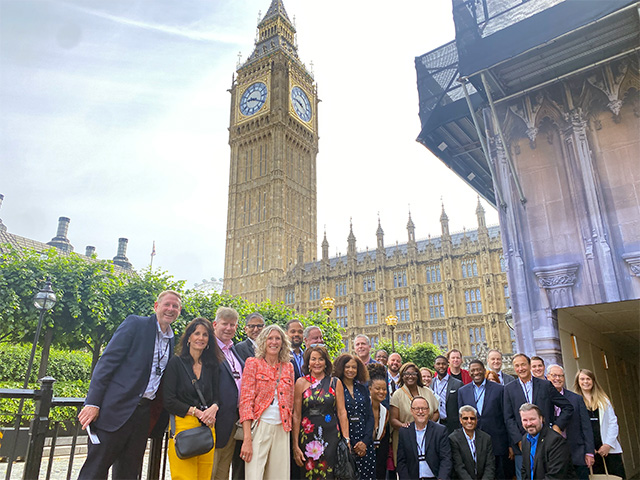
Metro business and civic leaders travel to the UK to pitch St. Louis on a global stage
While there, they met with leadership and companies that are part of Agri-TechE, a leading AgTech innovation network based in Cambridge. Nearly a dozen startup companies shared their innovative solutions with the group during a lightning pitch round and participated in one-on-one conversations with the delegation to learn more about their organizations, and the 39 North AgTech Innovation District.
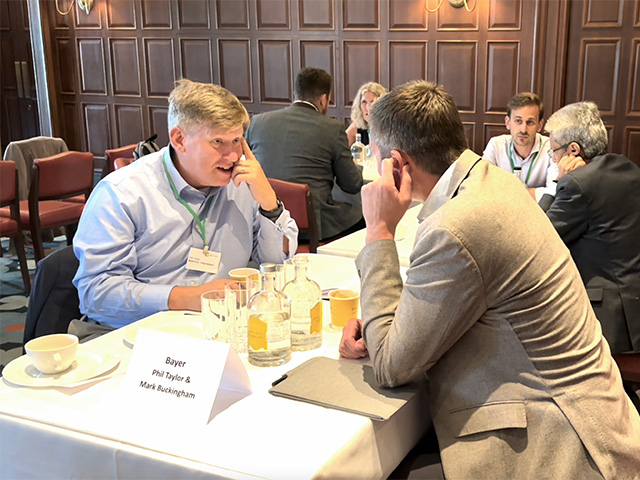
As part of the Agtech challenge with Agri-TechE, UK-based entrepreneurs engage in conversations with representatives of the region’s agtech ecosystem. (Photo credit: Nine PBS)
“It’s always great to meet innovative new agtech companies and explore partnerships, but for St. Louis to have the opportunity to do this as a cohesive ecosystem is truly exciting,” said Taylor. “The fact that the companies can see all that our region has to offer creates a much more compelling value proposition and improves the odds of a win-win outcome.”
Following the event, The Member of Parliament for Cambridge, Daniel Zeichner, who is the Shadow Minister for Department of Environment, Food & Rural Affairs hosted the group for dinner and additional conversation with others involved in the UK agtech sector.
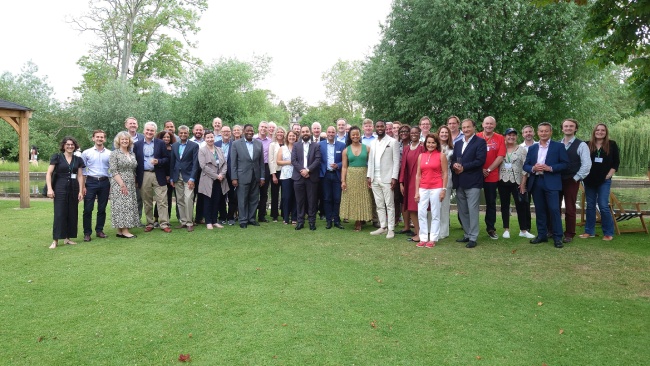
Agri-TechE Trade delegation and AgriTechE members gather in Cambridge to create connections aimed at growing ag innovation (Photo credit: Agri-TechE)
“It was rewarding to meet with UK entrepreneurs and witness their genuine interest in learning about the Danforth Center and 39 North,” said Roeber. “Several people I spoke to are planning visit later this year to see our value proposition first-hand.”
Salinas, California
In Salinas, California, the Western Growers Center for Innovation and Technology hosted the first major conference focused on a topic that the Danforth Center and 39 North community know well: biological amendments. A biological amendment is a product that offers a natural alternative to more commonly used synthetic crop treatments such as pesticides, fungicides, and fertilizers; rather than relying on synthetic chemicals with the potential to harm humans and the environment, biological alternatives incorporate technology that leverages plants’ natural abilities to grow, resist disease, or fend off pests.
“There is a wealth of global interest in biological alternatives right now,” says Danforth Center Director of Commercial Innovation Elliott Kellner, PhD, who attended the Salinas Biological Summit. “This conference was an opportunity to bring people together to strategize about ways to advance these products to market. The whole value chain—from innovators to investors to producers—was represented, and people were excited to engage and contribute to solving the sticky issues.”
Kellner attended to showcase the region’s expertise in the sector. “The Danforth Center has some of the best entomologists and plant scientists in the world, and agtech companies are eager to work with them,” Kellner says. “When a company is presenting its product to an investor, they need to be able to show not only that it works, but also why it works. Our researchers can generate that key information.”
At the conference, Kellner was able to connect with others who are working in this space and share about the unique resources St. Louis has to offer. He hopes that connections like these will facilitate collaboration and accelerate the process of implementing these healthier, more eco-friendly products in the real world.
“The potential for biological technology to improve sustainability is exciting,” he says, “and an important component of our agtech ecosystem.”
A Spirit of Collaboration
The regional teams returned from their travels excited by the collaborative mindset they witnessed and the global enthusiasm for developing solutions to the challenges that threaten the health of people and the planet. “Everyone has a strong, legitimate desire to work together,” Regagnon said, “and I know each of us returned to St. Louis inspired, refreshed, and ready to get to work on further cultivating these relationships.”
Emily Lohse-Busch, executive director at 39 North, sees tremendous value for 39 North and our agrifood tech ecosystem through these global connections “When you’re working with people who are thinking collaboratively instead of competitively, you can unlock doors together—everybody can win.”